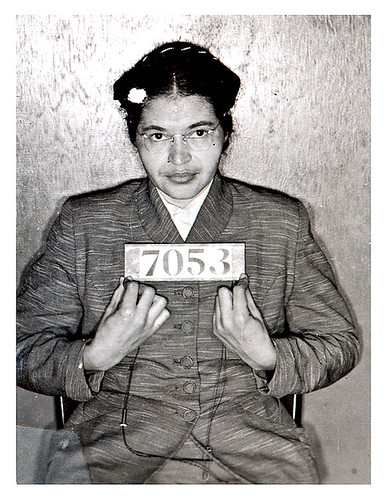The archive of Rosa Parks (1913-2005)—the civil rights activist who made history when she refused to relinquish her seat on a segregated bus in Montgomery, Alabama in 1955—is up for sale. The 8,000 or so items in the archive include a wide assortment of documents and artifacts—correspondence; books inscribed to Parks by Dr. Martin Luther King and President Clinton; tributes from school children; as well as personal items like Parks’ eyeglasses, driver’s license, address book, and even the hat she wore on the day of her historic bus ride.
The Associated Press article that caught my eye and alerted me to the archive’s availability and content was not, however, so much of an announcement of the archive’s pending disposition by Guernsey’s Auctioneers in New York, as it was a report about a six-page document in the archive—a first-person essay in which Parks describes the experience of a young African American housekeeper who was sexually assaulted by a white neighbor who employed her in 1931. The question the document has raised is whether its content is autobiographical or a piece of fiction, as some people close to Parks’ estate maintain. No matter which it is, what struck me was that when it comes to news about archives, it’s the provocative or controversial angles that insure a story will get picked up widely by the media.
As it turns out, there’s even more controversy and another, more complicated story to be told. According to an article in the Detroit Free Press, six years after her death, the Rosa Parks archive is being sold by order of the Michigan courts as part of a resolution to end an ongoing dispute between Parks’ surviving relatives and the Rosa and Raymond Parks Institute for Self Development in Detroit, which Parks established and gifted the bulk of her property to so it could help teach young people about the civil rights struggle, and continue her work.
Legal costs to win control over both the archive and rights to use Parks’ name have, as you might imagine, run through most of the cash assets of Parks’ estate, estimated at $372,000 at the time of her death. It’s believed that the sale of the archives, which Guernsey’s estimates may generate as much as an $8–10 million sales price, will insure a good home for the unique trove of historic materials and move the parties in question toward a settlement.
Produced by the Smithsonian Institution Archives. For copyright questions, please see the Terms of Use.


Leave a Comment